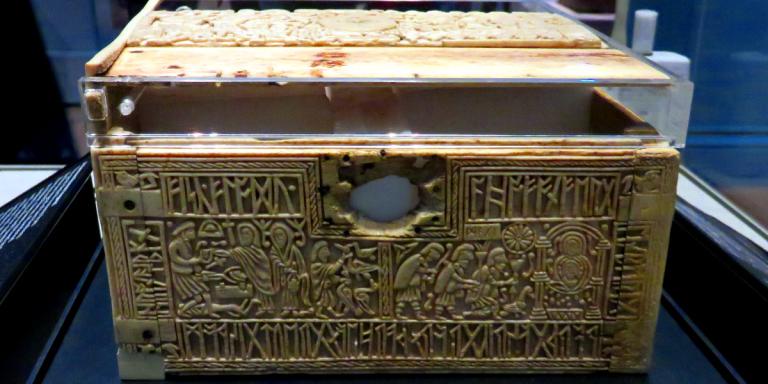Maybe this was your first time, or maybe it’s happened before. You walked outside, looked up at a full moon, and it grabbed you. You had a dream that was much more than a dream. Maybe you participated in a certain ritual in Denton last night.
You had a religious experience.
Some are mild and some are earth-shattering, but religious and mystical experiences are some of the most meaningful events in our lives. They are also some of the most perplexing. We struggle to describe them and we struggle even more to understand them, to the point that some people tell us not to try. Just enjoy them and appreciate them, they say.
If that’s your choice, so be it – your life, your choice. But that strikes me as the equivalent of finding a locked box in your dead grandmother’s attic, setting it on your mantle, and never trying to open it. Yes, it’s beautiful, and yes, it’s a connection to your beloved ancestor. But there may be something inside the box that will change your life.
You don’t want to force it open with a blunt instrument – that may damage the contents as well as ruining the box. But it’s worth examining the box for a release mechanism, searching the rest of the attic for a key, calling a locksmith, or consulting an expert in old locked boxes.
Unlocking a religious or mystical experience is a matter of interpretation: putting it into context, figuring out what it means, and deciding how to respond.
Putting it into context
We understand our experiences – religious or otherwise – by locating them in the context of our other experiences and of our assumptions about the way the world works. A Wiccan, a Baptist, and an atheist can look up at the same full moon and have a similar experience, but they will interpret them in very different ways because of their very different ideas about the moon. Is the moon a Goddess or the manifestation of a Goddess? Is it the glorious work of a creator deity? Or is it only a satellite reflecting the light of the nearest star? One common experience will yield three different interpretations because of three different contexts.
If your experience doesn’t fit into your context, it may be time to adjust your foundational assumptions. In my early Pagan days, I often repeated the saying “all Gods are one God and all Goddesses are one Goddess.” That was easy for me to accept, coming from a monotheist background. And it fit into my desire for there to be an ultimate unity of all things. But when I began to work with the Gods of Egypt, my experiences of the various deities were so different I was forced to reconsider that assumption. My experiences were better explained by many individual Gods rather than by one God with many faces. I had to change my ideas about the nature of the Gods.
Building context requires work, and it’s best done ahead of time. I see too many people (not all of them Pagans) interpret a religious experience in the context of a fantasy novel or a TV show because that’s all they know. Read, study, practice, and think. Examine your unquestioned assumptions.
If you have a religious experience and you haven’t built a good context, you’re going to have to rely on someone else to provide a context for you. Choose your mystical locksmiths with great care. And then get to work building your own model of the way the world works.
Figuring out what it means
You felt the Stag God breathing down your neck. You had dreams of dogs, keys, and crossroads. Crows keep showing up in places where crows rarely are. You stared up at the moon and you were overcome with a powerful feeling you can’t describe.
Context helps you relate your experience to other experiences and to your ideas about the world. But you still have to figure out what it means.
Start with your intuition. What does this feel like to you? Where does this have relevance? What’s going on – in your life or in the wider world – where this would be helpful? Where have you seen and heard this before, perhaps in a more mundane setting? While figuring out exactly what a religious experience means can be difficult, it’s rare that you have no idea where to start.
Check for consistency and biases. Did the Stag God tell you to plant trees? That’s probably Him talking to you. Did He tell you to buy a new pickup truck to commute to work? That’s probably not what He was trying to tell you. (I have nothing against pickup trucks – I’ve owned three. They’re great if you need to haul stuff, but they make lousy commuter cars.)
Religious experiences tend to be transformative, not comforting. If your interpretation tells you what you want to hear, be very very skeptical.
Consult a good diviner. Why all the mystery? Why can’t the Gods and spirits just speak to us directly? That’s a different post for a different time, but the short answer is that they can. Divination allows us to ask direct questions and receive direct answers… sometimes, anyway.
If you can read for yourself, break out your cards, runes, or oghams. If you can’t, find a professional diviner. If it’s really important, consult a professional diviner anyway. There’s nothing like having someone confirm your readings… or having someone point out a really important thing you missed.
Deciding how to respond
Hearing the message loud and clear is critical, but it’s not the end of the process. How are you going to respond? Religious and mystical experiences do not happen for your entertainment and they rarely happen to make you feel good about yourself. They may be a very good thing for you, but they are not likely to make your life more comfortable.
Most of the religious experiences I’ve had have been a call to deeper relationships. A God I barely knew jumped into me and told me who He was. That was about all I could handle at the time. I started regular prayers and meditations, I started learning more and more about who He is, and started doing His work. Eleven years later, the relationship is stronger than ever.
Sometimes I’ve had experiences with very specific instructions, but more often they’ve called me to take a further step down a path… or to leave the path for uncharted territory. I frequently don’t know exactly what I’m doing till I get there – and sometimes not even then. But I’ve learned that when an offer or a request or an assignment is made, say yes. Not because I must obey, but because I want to be a part of something bigger than myself, even if it’s hard, and even if it’s scary.
Opening to religious experiences
What if you haven’t had a religious experience, but you want to? First, be careful what you wish for. These experiences are powerful, but they can turn your life upside down. If you aren’t prepared to be transformed, stay away from them.
If you are prepared to change and be changed, know that these experiences cannot be produced on demand. But there are things you can do to make them more likely, starting with deep practice.
Not every religious experience involves a God picking you up and throwing you across the room – for which I am thankful! Some are dramatic, but others are very mild. That doesn’t mean they’re any less real or any less important. Don’t ignore the whispers because you were expecting a shout.
What’s important is that something – or Someone – speaks to you, that you place the message into context, that you figure out what it means, and most importantly, that you decide how best to respond.




















